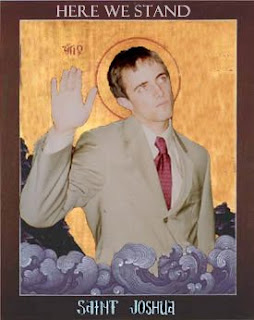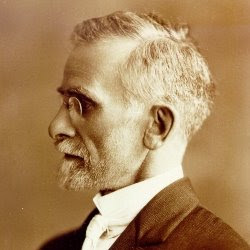 You may have seen this floating around the net, but, if not, I'm posting it here.
You may have seen this floating around the net, but, if not, I'm posting it here.Its Time: LCMS Unity and Mission
 "And this is the reason why our theology is certain: it snatches us away from ourselves and places us outside ourselves, so that we depend not on our own strength, conscience, mind, person, or works but on what is outside us, that is, on the promise and truth of God, which cannot deceive." ------Martin Luther
"And this is the reason why our theology is certain: it snatches us away from ourselves and places us outside ourselves, so that we depend not on our own strength, conscience, mind, person, or works but on what is outside us, that is, on the promise and truth of God, which cannot deceive." ------Martin Luther You may have seen this floating around the net, but, if not, I'm posting it here.
You may have seen this floating around the net, but, if not, I'm posting it here. I meant to write a original post today, but never got around to it. So...I'm stealing a post from Cruising Down the Coast of the High Barbaree called What is the Point of Religion. I'll let the Fearsome Pirate do most of the talking, but I thought there was a strong parallel between this post and what J.P. Koehler talks about. Mainly I mean when Koehler emphasizes that when anything replaces the clear testimony of the gospel and when we recieve our motivations from the flesh rather than the gospel, this unfaillingly leads to death and stagnation in the church.
I meant to write a original post today, but never got around to it. So...I'm stealing a post from Cruising Down the Coast of the High Barbaree called What is the Point of Religion. I'll let the Fearsome Pirate do most of the talking, but I thought there was a strong parallel between this post and what J.P. Koehler talks about. Mainly I mean when Koehler emphasizes that when anything replaces the clear testimony of the gospel and when we recieve our motivations from the flesh rather than the gospel, this unfaillingly leads to death and stagnation in the church. Matt Harrison has created the best LC-MS blog around. If you have not stopped by, I highly encourage that you do. He is always posting things from the early days of the synod (translating them on a drop of a hat it seems). This post from him: Are Our Best Days Behind Us? Schwan 1865, is a great self assesment that we should always be asking as a synod. This is Harrison's introduction:
Matt Harrison has created the best LC-MS blog around. If you have not stopped by, I highly encourage that you do. He is always posting things from the early days of the synod (translating them on a drop of a hat it seems). This post from him: Are Our Best Days Behind Us? Schwan 1865, is a great self assesment that we should always be asking as a synod. This is Harrison's introduction: Probably more than any other theologian, John Philipp Koehler has influenced me the most. His approach to theology and his keen insight into human behavior is astonishing. Gesetzlich Wesen Unter Uns, "Legalism Among Us," is a great example of his thought. Not only has he had a big influence on my own thought, he is also timeless in his observations. His intimate awareness of man's opinio legis, man's law bent mind, is always applicable, for there is nothing new under the sun. Though written in 1914 his words speak directly to what is going on (in many camps) in the LC-MS today. These words from another essay from Koehler seem especially applicable in our situation:
Probably more than any other theologian, John Philipp Koehler has influenced me the most. His approach to theology and his keen insight into human behavior is astonishing. Gesetzlich Wesen Unter Uns, "Legalism Among Us," is a great example of his thought. Not only has he had a big influence on my own thought, he is also timeless in his observations. His intimate awareness of man's opinio legis, man's law bent mind, is always applicable, for there is nothing new under the sun. Though written in 1914 his words speak directly to what is going on (in many camps) in the LC-MS today. These words from another essay from Koehler seem especially applicable in our situation: "Every kind of society, church groups included, is seized by the hurrah phenomenon and as such it becomes apparent generally at a time when a certain goal is to be reached quickly by a drive with external blatant means. All this hurrah business has certain traits which make it evident in arising out of the flesh; they are: 1) It appeals to the natural brutal sense in man, indicating that those who make use of it are willing to accommodate external brute force. 2) In a rousing attack, force is applied to accomplish with the might that which quiet, sustaining and thorough work cannot be relied on to produce. 3) Mass agitation is the object and the individual must be swept along by force with the crowd, because there is no confidence in the spontaneous decision of the individual personality. 4) The promoter, by noisy conduct, attracts attention to his own person. 5) Thus he would put himself across together with his concepts and aims, yet indeed not by an inward conviction of his fellow men but by the use of external means. 6) By so doing, love toward neighbor is forgotten, while selfishness, disaffection and malice have an open field. 7) Finally, hurrah sentiment always has the nature of clever fabrication. Headlines there are, true enough, and slogans that would give the impression of genuine value. Yet it does not carry the imprint of something which grew out of the unencumbered understanding of intelligent men of character and blossomed forth into an overwhelming truth...Now, sanctification, our actual Christian business, doesn't agree with that sort of thing. When once it becomes apparent that sanctification is in every point the direct opposite of hurrah sentiment, then every Christian ought to see for himself that we must avoid this general ruling spirit of the time."
 l proclamation of the truths of Scripture. Koehler's mind was very unique and intuitive. He studied under C.F.W. Walther and Georg Stoeckhardt. From them he took back to Wisconsin a love for the practical and living theology of law and gospel from Walther, and a love for and an urgency to return to the Bible through exegetical theology from Stoeckhardt. Koehler drew on his vast and eccentric loves and knowledge for his thought, he was a very talented historian and exegetical theologian, he was also a very talented musician, artist, and architect. He was the designer of St. Johannes Lutheran Church in Two Rivers, Wisconsin. Also, according to musicologist Walter E. Buszin, Koehler was the first American musicologist to edit professionally published Reformation and Baroque music like Perlen alter Kirchenmusik (1905) and Das Gemeindelied (1911).
l proclamation of the truths of Scripture. Koehler's mind was very unique and intuitive. He studied under C.F.W. Walther and Georg Stoeckhardt. From them he took back to Wisconsin a love for the practical and living theology of law and gospel from Walther, and a love for and an urgency to return to the Bible through exegetical theology from Stoeckhardt. Koehler drew on his vast and eccentric loves and knowledge for his thought, he was a very talented historian and exegetical theologian, he was also a very talented musician, artist, and architect. He was the designer of St. Johannes Lutheran Church in Two Rivers, Wisconsin. Also, according to musicologist Walter E. Buszin, Koehler was the first American musicologist to edit professionally published Reformation and Baroque music like Perlen alter Kirchenmusik (1905) and Das Gemeindelied (1911).
